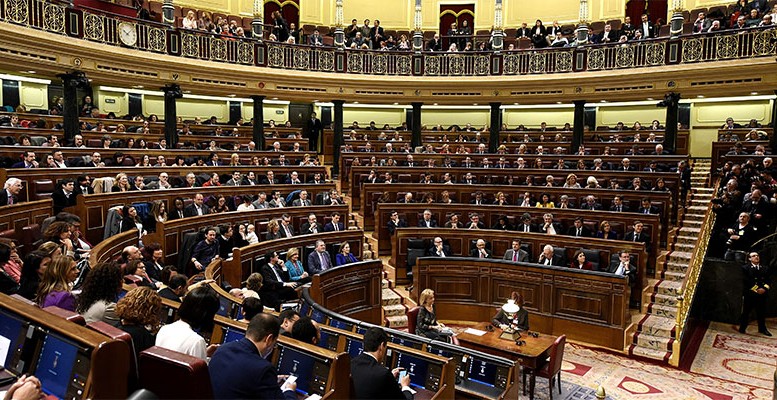Another heart-stopping vote. Now for the audiovisual law. Once again, the Government has ended up at odds with its partners and, on this occasion, also with itself. The PSOE and Unidas Podemos have split with a vote in favour and an abstention, respectively, despite the fact that it is a law that has been sponsored by the Executive itself.
This was evident in the vote: 130 yeses (PSOE, PNV, CC, NC, PRC), 83 noes (Vox, ERC, EH Bildu, Junts, Más País, PDeCAT) and 131 abstentions (PP, Unidas Podemos, Ciudadanos).
Thus, the PP’s abstention was decisive for the Executive to have managed to get the audiovisual law passed in Congress. However, this numerical victory has consequences for the PSOE, because it has opened up another new crisis with its allies in ERC and EH Bildu, with whom trust is increasingly eroded by the Pegasus case, and an internal clash in the coalition with Unidas Podemos.
The twist that has placed the law in a serious predicament and left it in the hands of the PP occurred at the end of its processing, when the PSOE introduced a last-minute amendment that has put the production companies and the world of cinema on the warpath. More than 350 directors, independent producers and actors have signed a manifesto, headed by Pedro Almodóvar, Paco León, Icíar Bollaín and Antonio Resines. Their complaint is that the change of a single word will allow large corporations (Atresmedia and Mediaset) access to the quota that is reserved for independent production, which puts this sector at “mortal” risk.
This amendment has “blown to bits”, in the words of ERC, the pact reached between the government and its investiture partners. And it caused many of them to switch from voting in favour to voting against in a few hours, putting the approval of the text on the ropes. Amongst them is Unidas Podemos, which argues that the law will serve the interests of the “oligopoly of the four big television channels”.
The agreement was reached after tortuous negotiations dating back to last autumn, when ERC and EH Bildu forced the government to accept certain demands in the law in order to approve the General State Budget. In short, these demands were aimed at protecting productions in the co-official languages (Catalan, Basque and Galician) on the major audiovisual platforms (Netflix, HBO Max and Disney+).
This is the second time this month that the PP has saved a fundamental law for the Government from being overturned by its own parliamentary allies. Now the audiovisual law has gone thanks to an abstention, but on 2 May it also did so with the National Security law, when it voted against an amendment to the totality presented by ERC. Similarly, the PP also recently helped the Executive when it voted against creating a commission of enquiry into the Pegasus case.





